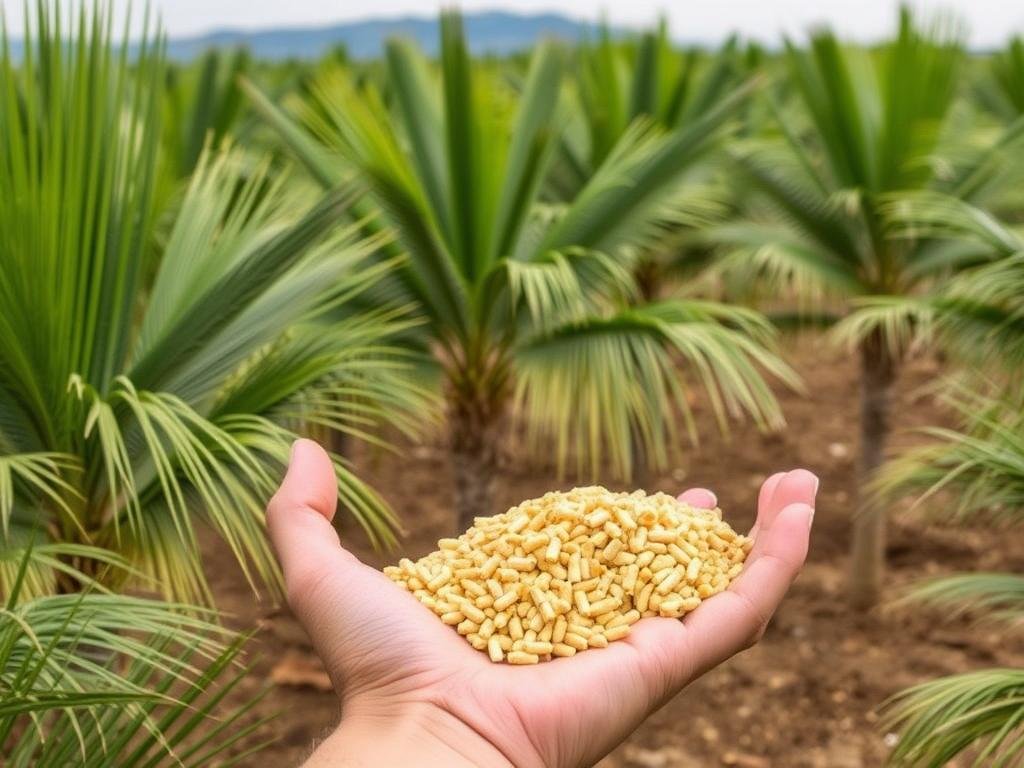棕榈仁壳欧盟生物燃料标准:2024年终极指南
目录
全球对可再生能源的推动使各种生物质能源备受关注,但在监管机构眼中,并非所有生物质能源都生来平等。对于能源行业的企业来说,一个关键问题浮现: 是 棕榈壳 (PKS)是否符合严格的欧盟生物燃料标准? 答案很复杂,它指向决定其在欧洲市场接受度的严格可持续性和可追溯性标准。
棕榈油工业的副产品——棕榈油(PKS),作为一种碳中和燃料,极具吸引力。然而,由于其与一个常被批评为森林砍伐的行业密切相关,它必须通过严格的认证。本指南将详细分析PKS在欧盟可再生能源框架下的基本要求及其现状。
棕榈仁壳(PKS)到底是什么?
棕榈仁壳是棕榈树在收获后留下的坚硬木质碎片。 棕榈仁 是从棕榈果的坚果中提取的。几十年来,这种物质经常被丢弃。然而,其固有的特性使其成为一种极好的能源,可以将废物转化为有价值的商品,以及其他有用的副产品,例如 棕榈核榨油机 和纤维 油棕果串.
PKS的主要特性包括高热值(通常为16-19 MJ/kg)和低水分含量(尤其是在干燥后)。这些特性使其成为燃煤电厂混烧和工业锅炉的理想燃料,从而减少对化石燃料的依赖并降低温室气体净排放。
[图片建议 1:一堆棕榈仁壳的特写高分辨率照片,突出其纹理和深色。]
替代文本: 棕榈仁壳是正在接受审查的一种重要生物质产品,其详细视图 棕榈仁壳欧盟生物燃料标准.
了解严格的欧盟生物燃料标准 (RED II)
欧盟的生物燃料政策主要受《可再生能源指令》(最新修订版RED II)管辖。该指令规定了所有生物燃料、生物液体燃料和生物质燃料必须满足的法律框架和强制性可持续性标准,才能计入可再生能源目标并获得财政支持。
RED II 的核心要求包括:
- 温室气体(GHG)减排: 生物燃料必须证明其与化石燃料相比能够显著减少温室气体排放。目前,自2021年起,生物燃料的安装门槛设定为70%。
- 土地使用标准: 原材料不得来自生物多样性价值高(如原始森林)或碳储量高(如湿地和泥炭地)的土地。
- 可追溯性和监管链: 经济运营商必须拥有一个强大的系统来追踪生物质从其来源到最终用途,确保其满足整个供应链的所有可持续性标准。
任何不符合上述标准的行为都将导致生物质被归类为不合规。如需了解更多详细信息,您可以查看官方 欧盟可再生能源指令.
大问题:PKS 是否被欧盟接受?
那么,官方的结论是什么呢?是的,棕榈仁壳符合欧盟生物燃料法规的认可,但前提是它必须获得可持续且完全可追溯的认证。这并非一刀切的批准;每批棕榈仁壳都必须证明其符合规定。
这种有条件的接受是通过欧盟委员会认可的自愿认证计划来管理的。这些计划充当守门人,审核整个供应链,以确保其符合RED II指令。如果没有获得公认机构的认证,PKS实际上就被禁止进入欧盟生物燃料市场。
PKS 的主要认证方案包括:
- ISCC(国际可持续性与碳认证): 一项全球领先的认证计划,根据欧盟可持续性要求对生物质和生物能源进行认证。了解更多信息,请访问 ISCC 系统网站.
- RSPO(可持续棕榈油圆桌会议): 虽然专注于棕榈油,但其可持续种植园管理原则是证明PKS来源的基础。访问 RSPO 网站 了解他们的标准的更多信息。
关于PKS可持续性的争论
PKS 面临如此严格审查的主要原因是其与棕榈油行业的直接联系——棕榈油是 毛棕榈油 和 棕榈油——这在历史上一直与森林砍伐和栖息地丧失息息相关。欧盟决心防止其可再生能源政策无意中鼓励不可持续的土地利用变化。
一个关键因素是 棕榈仁壳欧盟生物燃料标准 将PKS归类为农业加工残留物。这种分类很有优势,因为作为残留物,它被认为具有零土地使用排放,因此更容易达到温室气体减排门槛。然而,这需要证明PKS确实是一种废弃物,而不是棕榈种植本身的驱动因素。
[图片建议 2:一张信息图展示了 PKS 供应链,从认证种植到分类、运输,最后到达欧洲发电厂。]
如何确保遵守欧盟生物燃料法规
对于希望在欧盟进行PKS贸易的供应商和买家来说,确保合规是一个不容置疑的、多步骤的过程。遵守这些步骤是满足欧盟严苛生物燃料法规的唯一途径。
- 来源:经过认证的种植园: 旅程始于源头。PKS 必须来自获得 RSPO 或同等认证的棕榈种植园。
- 建立清晰的监管链: 供应链中的每一方——从种植园到工厂、出口商和进口商——都必须成为经过认证和审核的监管链的一部分。
- 获得ISCC认证: 与ISCC等认证机构合作,审核并认证整个供应链。这可以提供欧盟当局要求的可持续性证明。
- 准确的温室气体计算和记录: 每一步都要详细记录温室气体排放情况,以证明已达到所需的减排目标。
欲了解更多关于可持续采购的见解,您可以阅读我们的指南 可持续生物质采购的重要性.
PKS在欧盟市场的未来
监管格局不断演变。即将出台的RED III指令预计将进一步收紧生物质的可持续性要求。这意味着对PKS和其他进口生物燃料的审查可能会更加严格。“不造成重大损害”原则将得到更严格的执行,更加重视生物多样性保护。
尽管如此,可验证的可持续PKS市场依然强劲。随着欧洲国家逐步淘汰煤炭,经过认证的PKS提供了一种现成的高能低碳替代方案。据 标普全球商品洞察,需求与经过认证的高质量材料的可用性直接相关。
[视频建议:来自新闻媒体或能源组织的简短视频,解释生物质在欧洲能源转型中的作用以及可持续性的重要性。]
结论:有条件批准PKS认证
总而言之,PKS 是否被接受的答案是有条件的“是”。决定其在欧盟法规下命运的并非材料本身,而是它的故事——它的起源、旅程和影响。对于经济运营者而言,这意味着认证不仅仅是纸面文件,更是在欧盟市场运营的许可证。
随着欧盟继续推进绿色转型,对高质量、可持续生物质的需求将不断增长。透明且负责任采购的生物质(PKS)将继续在这一转型中发挥关键作用,这表明,即使是来自复杂工业的副产品,只要符合最高标准,也能做出积极贡献。
您的合规 Palm 产品合作伙伴
准备好为欧盟市场采购经过认证的、可持续的棕榈产品了吗? 马克穆尔维Amanah班 是您值得信赖的合作伙伴。我们专注于提供符合严格国际标准的高品质、可追溯的生物质和油脂。
确保您的供应链合规可靠。立即联系我们的专家团队,探讨您的需求,确保您获得优质的棕榈产品供应。
立即联系我们:
- WhatsApp: +62 821-4000-2198
- 电子邮件: admin@makmuramanah.co.id
